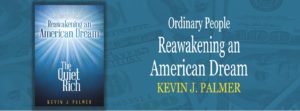Let it out and Let it in

My alma mater asked me to prepare a Business/Finance class. It will be called, Conversations about Financial Freedom for Reawaken American Dreams, (The Behavioral Aspect of Entrepreneurship).
Changes in philosophy about financial security from my undergraduate days are astonishing. On campus it is no longer about work and money but passion and purpose. Millennials like my daughter see things much differently than I did in those days. To my surprise she and her husband were the first of their friends to buy a home and when I told her how proud I was of that crowning achievement. She said to my surprise, “Now I need to be a vibrant member of my community.”
My daughter is not much different than her millennial peers. When it came to personal entrepreneurship, she said, “I don’t want to sell products I want to be part of a movement.” My musical response, ‘“… Jude you’ll do, the movement you need is on your shoulder.”’
That is why I’m excited to teach “the behavioral aspect of entrepreneurship”. It is imperative for colleges today to customize economic teachings because business opportunities are endless—as are potential mistakes. To drive home my point I highlighted the case of Robert Fulton for my daughter.
As a former resident of New York I reminded her that Robert Fulton changed a small part of the world in 1807 when he ran his steamboat up the Hudson River to Albany. Astute business pupils might better realize Fulton didn’t even invent the steamboat. William Henry built it in 1763, and a guy named John Fitch, perfected the idea in 1787. The problem for all three entrepreneurs was nobody would pay for a ride.
Finally Fulton built and sailed, er’ I mean motored, the first boat up the North River (that’s what the Hudson was called at the time). The boat ran at about 5 mph and made it to Albany in 32 long muggy hours. By the end of the trip Fulton was miserable because he had brought a group of free-riding invitees to Albany and convinced only one to pay.
Fulton knew his business model needed to be bigger. So he wrote to President Jefferson and offered to manufacture steamboats as a launch-point for torpedoes to protect America’s harbors. Jefferson politely balked and said. ‘If you could combine the torpedo with a new invention called the submarine it might change warfare.’ Fulton, thinking it a silly idea stuck to building steamboats.
If Fulton was taught “the behavioral aspect of entrepreneurship” he may have explored a different tact. When the Great Recession hit in 2008, it became clear that monetary policy alone would not be enough to prevent a severe downturn. Unfortunately, macroeconomic behavioral research on fiscal policy was all but absent from the literature and for the most part policymakers were operating in the dark. However, it became clear that average folks could do above average things to equalize economics in the country.
My course, “Conversations about Financial Freedom for Reawaken American Dreams”, will show how everyday Americans can grow rich quietly, guided every step of the way by a moral and ethical compass. And how Americans can apply, (among a plethora of virtues) wisdom, courage, and confidence to build meaningful, fruitful lives while amassing wealth.
As Americans we can join the words “rich” and “good” and clearly demonstrate that there is no need for polar opposites when it comes to growing financial freedom for any generation.
Kevin J. Palmer
The Quiet Rich

Kevin J. Palmer uses his Wealth Stratification expertise to understand markets and as a writer/producer to champion financial justice. He has spent decades driving profits and performance for Wall Street firms and developed high margin revenue business models that allowed broker-dealers to gain substantial competitive advantage. He was responsible for improvements in financial delivery systems and a recurring revenue models that were scalable across the United States. He pioneered innovative strategy and mission statements cascading them to ranking staff, for implementation on a national scale.
Recently at his behavioral finance firm, this recognized wealth expert, mapped how ordinary people used cognition and personality to make financial decisions that created wealth. In his book “The Quiet Rich, Ordinary People Reawakening an American Dream” this champion of Financial Justice illustrates how socioeconomic understandings can translate into financial freedom and improved human condition.
Writer, Rebel, Producer, Poet
Established under The Palmer Holding Group Ltd., a company grounded on two generations of integrity, accountability and citizenship.
The information contained herein has been obtained from reliable sources however may not be accurate and is not guaranteed by us. Readers are encouraged to undertake their own independent investigation and evaluation of the relevant facts. All claims and allegations are subject to adjudication, decisions may be subject to appeal, and no inference is intended, nor should any inference be made from any information contained herein from any source. This posting and the information on our website is for general information purposes only. This content should be not considered legal advice, and any responses, comments, e-mails, other communications do not form any attorney client relationship.
Comments are closed
Author and Activist
Financial Literacy 501c3
Economic Activism
Wealth Expert
Wealth Stratification
Kevin J Palmer
Ridiculous Restraints
Limit personal freedom
Stifle entrepreneurship
Special interest groups
American Dream
Under Attack
Unreasonable Requirements
Honest Competition
Kevin Palmer
Economic Justice
Humble Warrior
Economic Oppression
Peace through Prosperity
Financial Freedom Activist
Kevin Palmer Scottsdale
Economic Understanding
Financial Literacy
Behavioral Finance Strategist
Economic Dignity
Improve quality of life
Resist
Question authority
Investing http://smainstitute.com/
https://thequietrich.com/tag/rebelmagazine-com/
https://kevinpalmerscottsdale.com/2019/04/11/election-time-and-more-of-the-same/